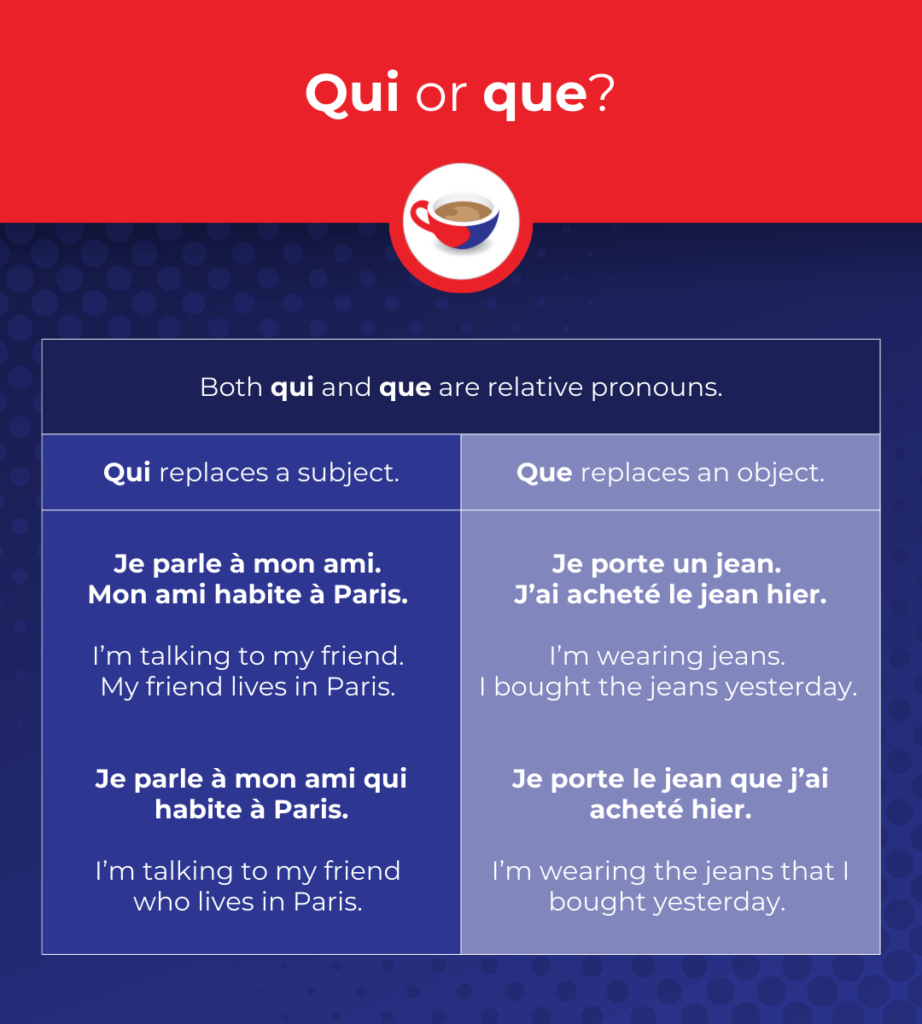Do you know the difference between qui and que?
Both qui and que are relative pronouns – designed to replace a noun in a sentence – yet, each has its distinct role.
When to use qui and when to use que is one of the questions we get asked the most by our Coffee Break French community. So, let’s explore both words so that we can better understand when to use each of them.
The Coffee Break French Show is a podcast series of bite-sized, friendly conversations, in which we demystify tricky French language topics. In the latest episode, Mark and Max discuss the meaning of qui and que and how to choose between them when speaking French.
Grasping the subtle differences between qui and que is a key step towards mastering French grammar. Continue reading to find out more and why not listen to the podcast as you go?
Using ‘qui’ to replace a subject
Starting with qui, this relative pronoun comes into play when replacing a subject – the thing that is carrying out the action of a verb. Qui can mean “who”, “which” or “that”.
For example, consider the following sentences.
Je parle à mon frère. Mon frère habite à Toulouse.
I am speaking to my brother. My brother lives in Toulouse.
By combining them, you get:
Je parle à mon frère qui habite à Toulouse.
I’m speaking to my brother who lives in Toulouse.
The use of qui helps to link the two sentences together. The brother is the person carrying out the action that follows in the next part of the sentence (in this case, living). This means that he is the subject of the verb habiter. So, when mon frère is replaced by a relative pronoun (to replace “my brother” with “who”) the relative pronoun has to be qui.
Using ‘que’ to replace a direct object
Now, let’s turn our attention to que, which replaces a direct object – the thing that is receiving the action of a verb. Que can mean “which”, “that” or “whom”.
Let’s look at the following sentences:
J’ai acheté un manteau. Le manteau est blanc.
I bought a coat. The coat is white.
When merged, you get:
Le manteau que j’ai acheté est blanc.
The coat that I bought is white.
Here, que replaces the direct object le manteau. This helps with clarity and conciseness.
The coat is the thing that is being bought. This means that it is the object of the verb acheter. So, when le manteau is replaced by a relative pronoun (to replace “the coat” with “that” or “which”) the relative pronoun has to be que.
Note that when preceding a vowel, que transforms into qu’. Qui, on the other hand, never changes when preceding a vowel.
A useful tip
In the episode, Mark shares a useful tip to help you know when to use qui and when to use que.
If the relative pronoun is followed immediately by a verb or a pronoun (for example, habiter, être or me, lui, y) then it is most likely to be qui. If the relative pronoun is followed immediately by a subject (for example, Jean, mon frère, je) then it has to be que.
More examples of ‘qui’ and ‘que’
To solidify our understanding, let’s explore a couple of additional examples.
J’ai un ami qui parle allemand et qui habite à Berlin.
I have a friend who speaks German and lives in Berlin.
C’est le film que j’ai regardé hier et que j’ai adoré.
It’s the film that I watched yesterday and loved.
These examples highlight the versatility of qui and que in constructing meaningful and precise sentences.
In conclusion

Make sure to listen to the full episode with Mark and Max on The Coffee Break French Show. This is the series in which we look at a range of topics for French learners, so make sure to subscribe to our podcast feed and our channel on YouTube.
Plus! To get regular free French lessons in your inbox, you can sign up for our short (coffee-break-sized) email lessons that will help you improve your French. You will also hear from Mark, the founder of Coffee Break Languages, giving advice for language learners at any level. Sign up below!
Qui and que are linguistic tools that will help you sound more confident when communicating in French. Keep exploring, keep learning, and enjoy the journey of mastering the French language!
Happy Coffee Breaking!



